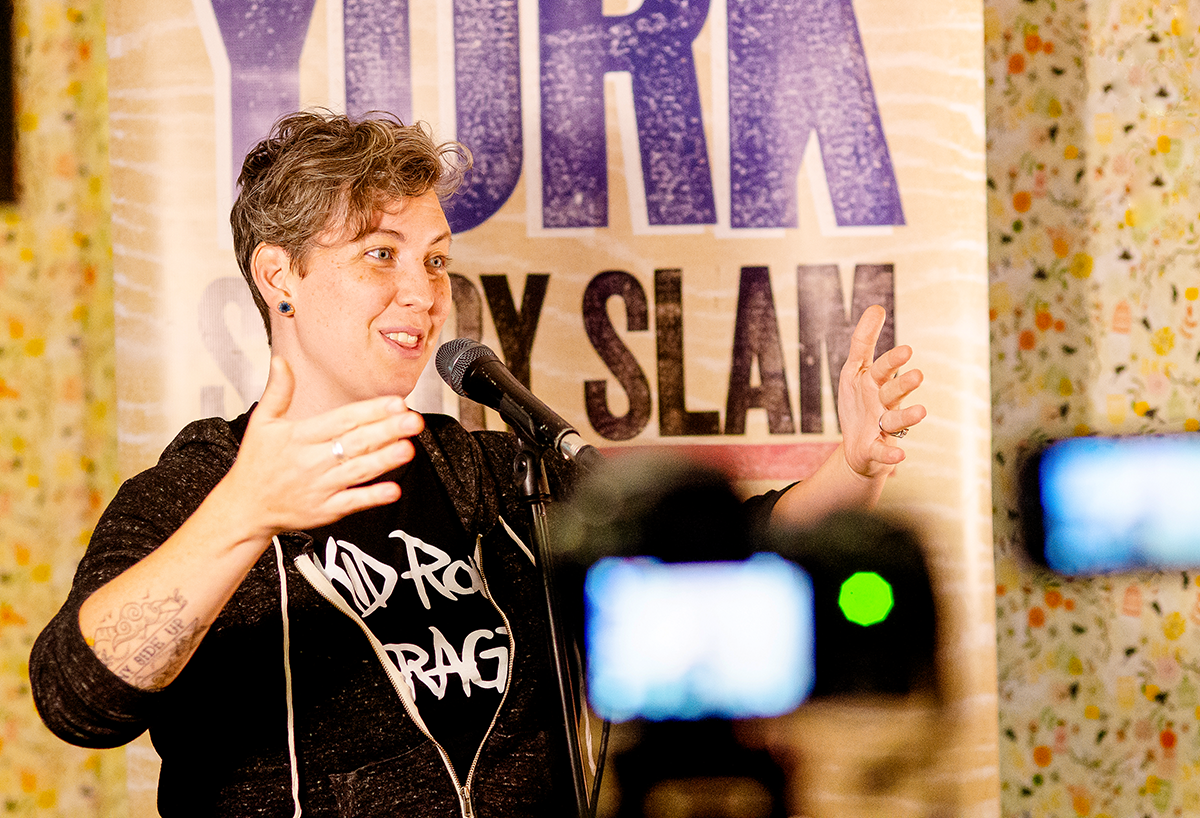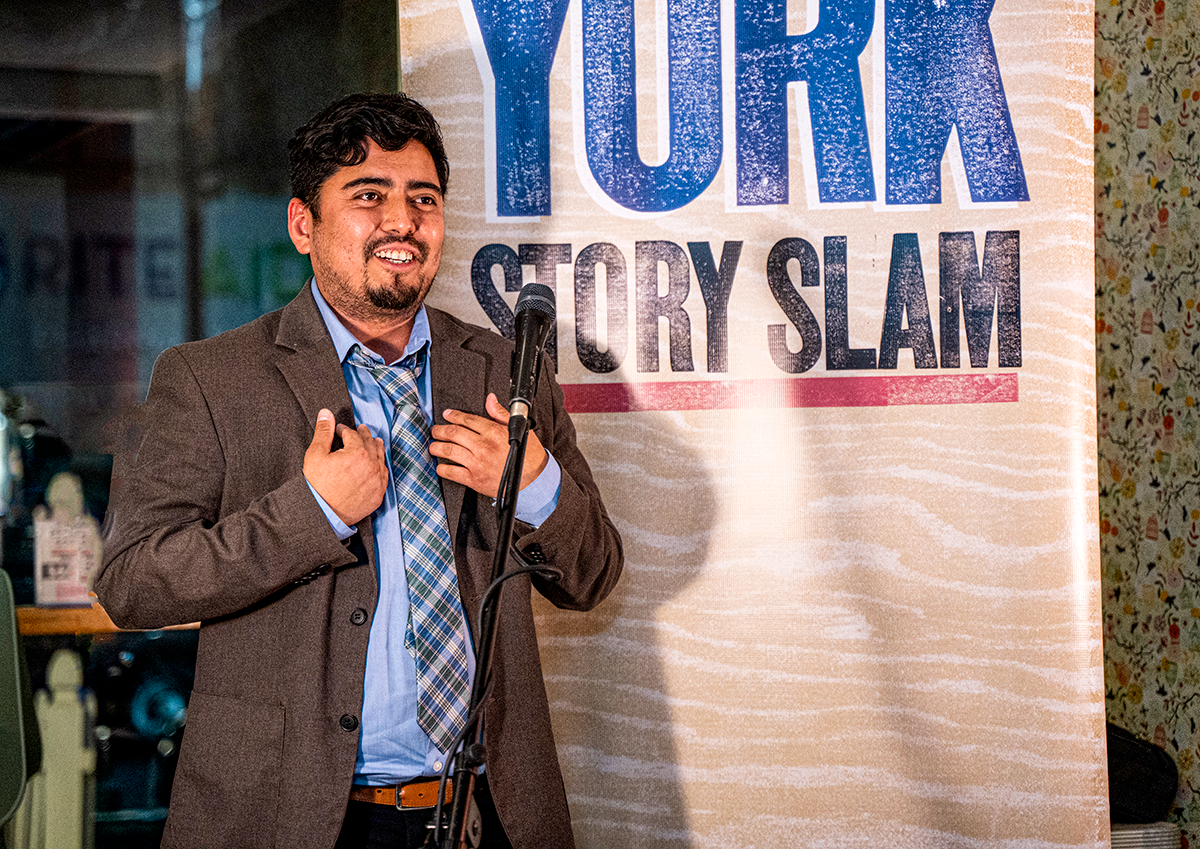York Storytellers Hit A Grand Slam
When the York Story Slam 2022 Grand Slam hits the Capitol stage on November 15th, audience members will be told some tales, but ones that you can trust. And you will be led through these personal accounts by storytellers that have already shown they're masters of the craft.
The Grand Slam follows several earlier events where our neighbors step up to the microphone and share a previous experience, often about a preset theme. The story must be true as the storyteller recalls it and must be related to the night's theme. Notes, props, and music aren't used, and the retelling needs to be (close to) five minutes long.
Three audience members are selected to be informal judges. While scoring isn't the point, the night's winner moves on to the annual Grand Slam. Overseeing the event and the York story slam series is JJ Sheffer, someone who knows both York and event programming well. Very well.
Sheffer has experience with some of York's most important institutions, including the York County Library System, ACCESS York, Downtown, Inc., and Leadership York. Her own organization, Enroot, is directly involved in city favorites PechaKucha Night York, Skillswap, One to One, and Kable House Presents, the concert series held at York's historic Central Market. The obvious commonality? Connection — specifically connecting people.
“If you think your town is missing something, roll up your sleeves and get that thing started.”
JJ explains, "I used to teach a special events course at York College. I'd always tell my students, "don't be the sort of person who says, 'they should have this in my town,' 'or they should do this differently.' Who do you think 'they' are? You're 'they.' If you think your town is missing something, roll up your sleeves and get that thing started.
"Whenever I had to travel to another town for something - live music, storytelling events, PechaKucha Night, for example - I'd think, York deserves to have this, too. And I'd get it started here in York. All of the events I produce are meant to help foster a sense of community for the people who participate, and they all use storytelling as the vehicle for making those connections."
That sense of community and connection provides social value, making the event an example of social entrepreneurship. (There are strong arguments regarding economic value to a region, as well.) This example demonstrates a phrase Sheffer will share, working "to give smart people an audience and a microphone."
Some readers may recognize the story slam format as that of a public radio program. That's not accidental.
"My introduction to story slams was through The Moth Radio Hour," Sheffer notes. "I'd first listened on WXPN, then subscribed to the podcast, then wanted to see a live story slam. It just so happened that when I googled to find live events in our area in 2015, Lancaster Story Slam had just started. I became a regular attendee and part of the community there. The next year, I started York Story Slam. There are quite a few around the region that are affiliated. We're branded the same, follow roughly the same format, and cross-promote. And people often find us the same way I did - because they're fans of The Moth and looking for something similar to participate in locally."
The York slams began in 2016 and were quite popular, often selling out the available seats. Open-mic slams start each year anew, running from January through October.
"These are not curated; we don't know until that evening who will put their name into the hat for a chance to tell a story or what they will share. We provide the theme and a few guidelines, and the participants provide the program content. The storytellers receive scores on content and presentation from three judges (volunteers from the audience)… The Grand Slam is our culminating event in November when all the winners of our open mic slams return to compete for the title of Best Storyteller in York."
“The best themes are ones that can be interpreted broadly… Sometimes you’ll hear a story that makes you cry, and right after that, one that makes you laugh til you cry. That’s a good night.”
Story themes for the coming year are announced each November, except for the Grand Slam's, which is revealed after the last qualifying event to avoid any unfair advantage to those winning early in the year.
JJ tells us that "the best themes are ones that can be interpreted broadly. It's really fun to see the creative ways people take the stories they want to tell and make them fit the themes. If we've come up with a good/broad enough theme, we get a good variety of subject matter in the stories and a wide range of emotions. Sometimes you'll hear a story that makes you cry, and right after that, one that makes you laugh til you cry. That's a good night."
Sheffer keeps a list of possible theme ideas and gets feedback from event advisors, including other slam producers, previous winners, and regularly attending audience members.
Asked if a storyteller could secretly pick her brain for slam presentation hints, she insists that there's "no need to pick my brain secretly! I love helping people develop as storytellers (I even teach workshops!).
"The most important thing is that your story should have an arc - a beginning, middle, and end. The best stories, in my opinion, are ones that sound conversational rather than rehearsed. Rather than scripting your story, I usually advise people to have an attention-grabbing opening, a clear ending, and know what points you want to cover along the way. Our 2017 Grand Slam champ, Eileen Joyce, likens storytelling to slalom skiing: you've got the starting line (opening line), finish line (ending), and the gates you want to hit on the route. In this analogy, Eileen is ad-libbing between the gates, and her story may be slightly different with each telling.
"Practice, but don't memorize it. It's your story - it happened to you. Trust yourself!"
She also suggests The Moth's "Tips and Tricks," which is very useful. Another resource is Brad Jennings' presentation on storytelling, found on YouTube. Brad was York's first story slam winner.
Responding to a question about tips for a first audience member, she shares that "storytellers are only half of the experience. Listeners are equally important. It's an exchange.
"From April 2020 through March 2022, we held our monthly events virtually via Zoom. It was wonderful during such a strange time to still have a way to gather and share stories, but it was a very different experience than our in-person events because the storytellers weren't getting the crowd reaction.
"As a listener, the best way to participate is to be present and give the storytellers your full, thoughtful attention. The Grand Slam always features such wonderful stories, and we can promise you'll be moved, entertained, and hopefully inspired to share a story of your own next season."
Tony Crocamo, Mina Edmondson, & Rita Whitney can give us unique perspectives shared by few: that of local story slam presenters. They were kind enough to provide me with insights via emailed interviews. (Edited lightly for this article's formatting.)
“My storytelling, both humorous and very personal stories, has created connections that would have taken hours to build individually… I have stories to tell, they may never become a book, but I wanted to see if my personal stories would resonate with others.”
Andrew Smith: "What drove you to consider participating in a story slam? Did that inspiration play out as expected?"
Tony Crocamo: "In 2001, I joined a Toastmasters Club for all the wrong reasons. Most people join Toastmasters to improve their public speaking skills. I did not think that was in the cards for me. I had difficulty speaking in front of a group larger than friends around a kitchen table, and I joined to write several stories I had in mind. I thought the discipline of having to prepare a speech would give me the discipline to write the stories, and it did. What I didn't expect was that confidence would sneak up on me, and I would eventually be comfortable speaking in public. As I became more familiar with writing speeches and speaking in public, I realized how important storytelling was to connecting with audiences. Out of curiosity, I attended a Lancaster Story Slam in late 2016 and was impressed with how welcoming and supportive the Story Slam Audience was. So, in 2017 I began to participate in LSS (Lancaster Story Slam.)."
Rita Whitney: “Shockingly, I'm an extrovert. I really enjoy having the opportunity to share stories about my life that I think are unique, funny, or interesting.”
Mina Edmondson: "I had several reasons… Initially, I wanted to challenge my public speaking skills. As the director of Martin Library, I was being engaged with public interview opportunities. Although I knew the answers to questions asked and understood the specifics for these types of interactions, I needed to learn how to be more genuine and relaxed during the interviews.
"I understand the value of stories and the impact they have. 'Facts is Facts,' as they say, but weaving those facts into relatable stories makes them memorable. I also wanted to build my connections in the community. My storytelling, both humorous and very personal stories, has created connections that would have taken hours to build individually. I have connections because people feel they know me or at least identify with my personal adventures or with my life experiences.
"I have stories to tell, they may never become a book, but I wanted to see if my personal stories would resonate with others."
“For some silly reason, I thought this would be the same as just telling a story to your friends at a party or a bar… I was truly humbled by the skill it takes to tell a good story in this environment.”
AS: "What was the most challenging part(s) of the experience? Is there anything you'd do differently?"
RW: “For some silly reason, I thought this would be the same as just telling a story to your friends at a party or a bar; not a lot of pre-planning, easy to wing it, and still be entertaining. But after watching some incredibly talented storytellers, fumbling my own stories multiple times, and learning more about the craft itself, I was truly humbled by the skill it takes to tell a good story in this environment. You have to have a cadence, a plot, a good story to even tell in the first place, a good hook, and a good ending. I am a person who generally loves to just wing it and dive in head first, but Story Slam has really helped me get better at planning, being more thoughtful about how and why I speak these stories, and to PRACTICE!”
ME: "Putting my name in the hat for the first time.
"I had wanted to participate for some time, but the topics did not connect with stories I felt I could tell. The first topic that I knew I could connect with was 'Bad Dates.' Since I was the queen of bad dates and had told my friends the stories of many of them, I had an arsenal of possibilities to choose from. The feedback from the audience was valuable and built my confidence even as I was telling the story. I won that first Story Slam with the dramatic events of a date gone horribly wrong. I went on and won the title of Best Storyteller in York in 2019.
"When Covid changed the format to online Story Slams, the audience was no longer visible. This was challenging because I was not receiving that direct feedback, but it also made it easier to tell those extremely personal stories. I began to pepper my storytelling with more challenging topics from my childhood. These were more difficult to tell. They were my stories, my life, and only I could tell them. Many of the listeners connected with the stories. Several connected with me either online or in the community and thanked me for telling those stories."
TC: "As you may know, the Lancaster and York Story Slams have the same basic rules… For me keeping a story to five minutes was, and continues to be, the most challenging part of the experience. Keeping only those details that advance the story without omitting any crucial information or raising unanswered questions takes focus."
“Connection is the key; the feelings, emotions, and experiences shared in true stories are common to us all—that’s the beauty and the value of storytelling. Stories are part of the human experience…”
AS: "For the first-time audience member, what should they watch for?"
ME: "A true story arc, setup, linear story, and an impactful ending.
"The originality of the story. What makes this story stand out from the others told or the more commonplace experiences we have all had? EX: a trip to 7-11 does not usually end with the police coming to your home or meeting the parents' becoming a helicopter trip to the hospital.
"Enough information so that you understand the setting and other key participants in the story. Did they talk about their pets? These steal the show. (Just kidding, but they do.) How the story is tied back to the theme.
"And especially, did the storyteller stay within or close to the 5-minute time limit?"
RW: “Just listen for the diversity of experiences of the people speaking. There is almost always something you can relate to from your own personal experiences that you may never have thought about before.”
TC: "First-time audience members should look for storytellers of varying degrees of experience, each of whom will connect with the audience in some way. Some storytellers are very new to the process, and what they may lack in delivery skills, they often make up in sincerity and genuineness. Sincerity will win over any audience.
"With experienced storytellers, the audience should expect a well-crafted, well-paced story — a story that connects with the audience. Connection is the key; the feelings, emotions, and experiences shared in true stories are common to us all—that's the beauty and the value of storytelling. Stories are part of the human experience; sharing stories allows each of us to see each other as similar to rather than different from. You find yourself relating to people you have never met but whose stories you now share."
JJ started many of these events independently but now continues with the support (employment) of the York County Economic Alliance. Events are continuing to bounce back from pandemic challenges, and audiences are passionate for more.
Over seven hundred and twenty-five stories have now been told via the York Story Slams, with more to come. JJ Sheffer has worked with both the presenters and audience members to ensure everyone has a memorable experience, but unfortunately, not all will be attending.
"I'll always wish more people knew we exist. This is our seventh season of live storytelling events in downtown York, and we still get people who show up and say they wish they'd have known about us sooner. Everyone is welcome, and we'd love to see you there, either to simply listen or to share a story of your own."
Now we know, and we should accept the invitation.
Thanks to Tony Crocamo, Mina Edmondson, Rita Whitney, and JJ Sheffer for their time and thoughtful responses. Discussions were lightly edited. All works copyright York Story Slam and/or Andrew T. Smith.





